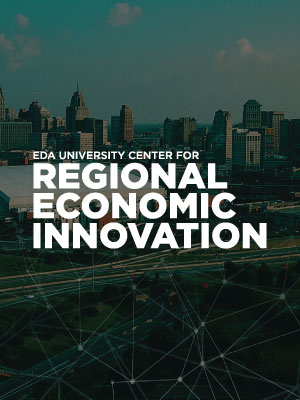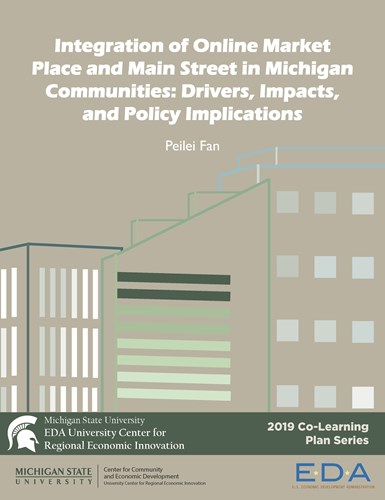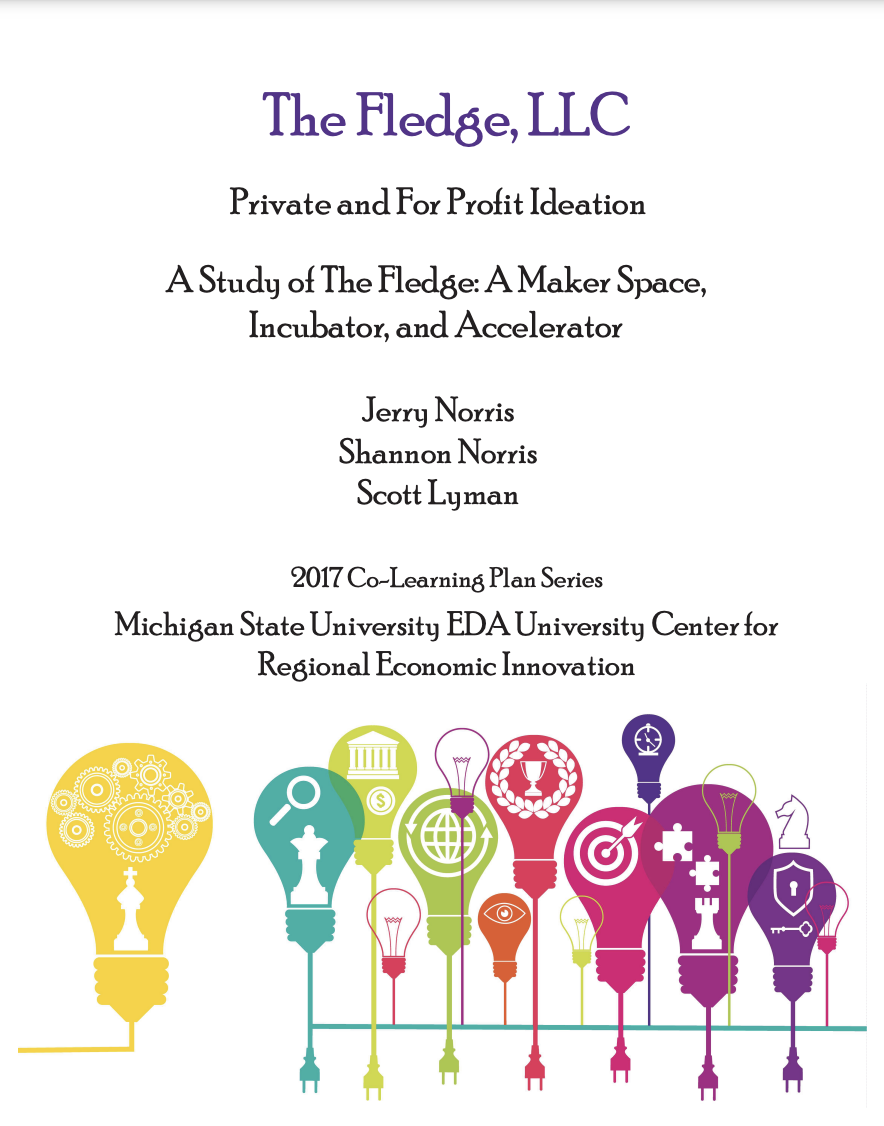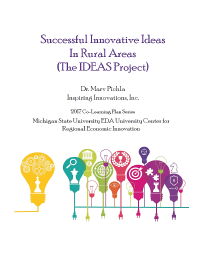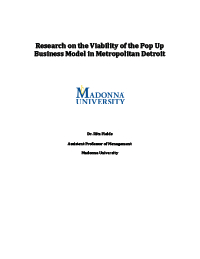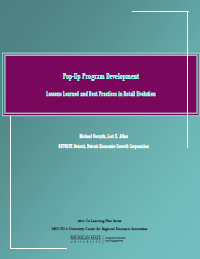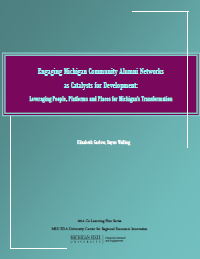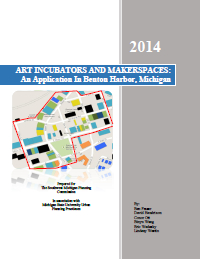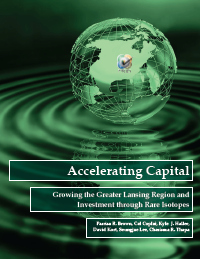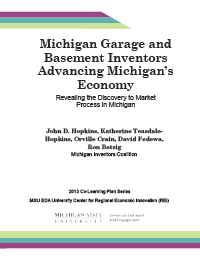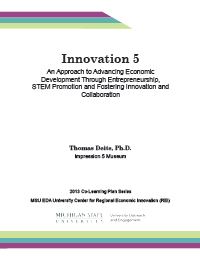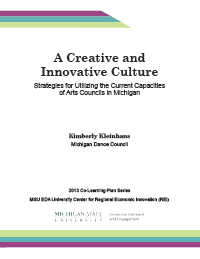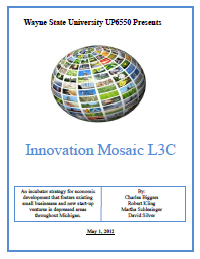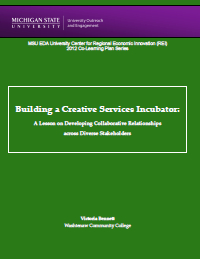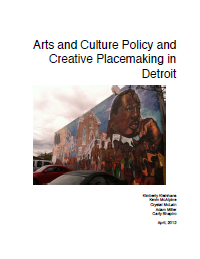Discovering and applying new and innovative economic development tools, models, policies, and programs
Creating Jobs and Wealth in Distressed Michigan Communities
Creativity and Invention
-
2024: The Align Center for Workforce Development
Author(s): Randy A. YagielaRead the Report About the ProjectThe Align Center aims to offer financial empowerment and training programs in a shared space for various organizations, but also fosters a collaborative culture focused on unified client pathways and employer-centric workforce certification. The project's goals are to create a unified resource center that addresses the gap in workforce training and local career development, especially for nontraditional clients overlooked by existing resources like MI Works. The leadership team, with a deep understanding of the intertwining of housing, transportation, and community needs, brings a holistic approach to workforce development. The project's economic impact is expected to be significant, with plans for a specialized campus catering to employer-specific skill needs, thereby generating living-wage jobs and attracting public/private investments. In summary, the Align Center project represents a comprehensive effort to revitalize a struggling community by integrating education, training, and economic development, with a focus on creating sustainable and equitable opportunities for the residents of Adrian and Lenawee County.
-
2020: Urban Planning Techniques and Sustainable Design for Autonomous Vehicles
Author(s): Dana DakeRead the Report About the ProjectThis project will shed new light on autonomous vehicles and the impacts that such a new form of mobility will present in many different ways. The research completed during this project will analyze sustainable design and urban planning techniques that are involved in the development of autonomous vehicles in Michigan. The information gathered will provide the necessary data for a comprehensive analysis of economic, social, and environmental infrastructure needs that will emerge as autonomous vehicle incorporation progresses as it will continue to do so.
-
2019: Integration of Online Market Place and Main Street in Michigan Communities: Drivers, Impacts, and Policy Implications
Author(s): Peilei Fan, MSU Urban PlanningRead the Report About the ProjectAgainst the reshuffled retailing landscape and the decline of traditional retailers, a hybrid strategy of combining online market place with main street, or dubbed as “click-and-mortar” electronic commerce, has gained increasing traction as a local proactive strategy due to benefits of cost-savings, improved differentiation, enhanced trust, and market extension (Steinfield et al, 2002). This proposal is to examine how online market place and main street can be best synergized for Michigan communities. The research questions are: (1) How have local business integrated e-commerce and reaped benefits of such integration? How have the built environment been transformed, either through a change in function for main street stores or the growth of fulfillment centers and logistics operations? (2) What are the key drivers and barriers that have affected the realizations of these benefits? What strategies may increase the integration? (3)What are the implications of exogenous factors, such as globalization, trade regime change, and tax regulations? A composite index to assess effective click-and-mortar integration will be developed based on the literature on the integration of click-and-mortar e-commerce, major benefits and pitfalls, strategies and best practices, and exogenous factors. Secondary data on click-and-mortar e-commerce of Michigan local business and communities at the county level or other local level will be collected and analyzed. Survey and interviews of local business and community will be conducted to identify drivers and barriers and strategies of the integration of on-line and physical structure of the business. A Co-Learning Plan and presentation materials (for REI) will be developed based on these research efforts.
-
2018: Creating a Fashion Entrepreneurship Community
Author(s): Meleena Herring & Joe Carr, The RunwayAbout the ProjectFashion, textile and design are ubiquitous and Michigan communities who capture the interest and energy of entrepreneurs in this industry can create, attract and retain talent while producing new companies and jobs. This plan will outline the analysis and design necessary to create a successful fashion entrepreneur ecosystem in any community.
-
2017: The Fledge
Author(s): Jerry Norris, The FledgeRead the Report About the ProjectThe Fledge is examining the validity of a private, for-profit business incubator. By studying the revenue and equity sharing model being used at the Grand Ledge Fledge, LLC., this Co-Learning Plan will produce recommendations on how to develop sustainable practices for a successful incubator model. Additionally, it will also describe the process used for innovation, planning, prototyping and launching a business within the Fledge.
Project Updated As Of September 30th, 2017
-
2017: Successful Innovative Ideas in Rural Areas
Author(s): Marv Pichla, Inspiring Innovation LLCRead the Report About the ProjectThis project will create a cooperative set of practices and initiatives to encourage entrepreneurial activity in Briley Township. Specifically, it will produce a Guide Book for Community Enhancement that will establish a formalized, user-friendly process for encouraging the identification and development of innovative collaboration, commerce, communication, building projects and programs. By disseminating this knowledge throughout Briley Township, a rural area with high unemployment, the goal is to spur innovation and improve the standing of the region as an entrepreneurial area.
Project Updated As Of September 30th, 2017
-
2016: Flint City Pop-Up
Author(s): Joel Rash, Red Ink FlintAbout the ProjectA city like Flint presents tremendous challenges to young people trying to start their own businesses. Yet Flint City Pop-Up worked to support emerging entrepreneurs through a combination of monthly meetings, regular pop-up shop opportunities, and hands-on mentoring. This strategy is of interest to educators, economic development professionals, and those interested in grassroots community initiatives.
Project Updated As Of September 30th, 2016
-
2014: Research on the Viability of the Pop-Up Business Model in Metropolitan Detroit
Author(s): Rita Fields, Madonna UniversityRead the Report About the ProjectThis project focused on a recent trend of utilizing pop up retail as an economic development strategy, specifically in Detroit. The project involved a data collection process and engagement process to utilize information from past pop up events for the planning and implementation of a pop up event. The two most important stakeholders with pop up retail are the land owners and the entrepreneurs. As a result, student teams were charged with conducting interviews with both landlords and pop up entrepreneurs. The results were used to create a pre-implementation framework that could be applied as guideline or checklist for landlords and entrepreneurs interested in launching a pop up business in the city of Detroit.
Project Updated As Of September 30th, 2014
-
2014: Pop-Up Program Development
Author(s): Michael Forsyth, Detroit Economic Growth Association, REVOLVE DetroitRead the Report About the ProjectThis Co-Learning Plan focused on the tangible tasks, challenges, and best practices associated with development and management of pop-up programs in Detroit and around the nation. Using 'REVOLVE Detroit' as a model, Forsyth highlights best practices and challenges.
Project Updated As Of September 30th, 2014
-
2014: Engaging Michigan Community Alumni Networks as Catalysts for Development: Leveraging People, Platforms and Places for Michigan's Transformation
Author(s): Elizabeth Garlow, Michigan Corps; Mayor Dayne Walling, Flint Club FounderRead the Report About the ProjectWhile focusing on how Michigan expatriates can play a role in revitalizing Michigan's urban economies, this plan outlined the untapped potential of and strategies for engaging alumni in tangible efforts that support cutting edge economic development and job creation, primarily through the lens of investing in entrepreneurs.
Project Updated As Of September 30th, 2014
-
2014: Arts Incubators and Makerspaces
Author(s): Ben Fraser, David Hendrixon, Conor Ott, Binyu Wang, Eric Wedesky, Lindsay Westin, Michigan State UniversityRead the Report About the ProjectAlternative economic development methods like a makerspace or arts incubator are necessary to enhance current development and encourage innovation. This report examined the feasibility of implementing creative spaces in Benton Harbor with the goal of increasing social capital within the area. Through extensive background research and case study review, this Co-Learning Plan delivers a comprehensive assessment on arts incubators and markerspaces.
Project Updated As Of September 30th, 2014
-
2014: Accelerating Capital: Growing the Greater Lansing Region and Investment through Rare Isotopes
Author(s): Parrisa Brown, Cal Coplai, Kyle J. Haller, David Kort, Seungjae Lee, Charisma Thapa, Michigan State UniversityRead the Report About the ProjectThis project involved an assessment of economic/entrepreneurial/ community impacts and opportunities created by the Facility for Rare Isotope Beams (FRIB) at MSU, and collected data and reported on existing particle accelerator facilities to recommend potential strategies and best practices to incorporate.
The Accelerating Capital Student-Led, Faculty-Guided Project was conducted in an effort to assess conditions and recommend strategies surrounding the Facility for Rare Isotope Beams (FRIB) particle accelerator facility on Michigan State University's campus. Construction started in 2014 and is scheduled to be completed in 2022. The facility will be instrumental in discovering properties of rare isotopes in order to better understand the physics of nuclei, nuclear astrophysics, fundamental interactions, and applications for society.
The MSU faculty and student team, with help from Lansing Economic Area Partnership (LEAP), aimed to compare elements surrounding the FRIB to successful existing facilities to strategize for a sustainable facility that will benefit the local community and economy. They chose four facilities that were similar in either size or scope upon which to conduct research. Those four are the TRIUMF Facility in Vancouver, Canada, the Jefferson Lab in Newport, Virginia, Fermilab in Batavia, Illinois, and the National Superconducting Cyclotron Laboratory (NCSL) on Michigan State's Campus.
After conducting all of their research, the project team made a few short term recommendations and many long term recommendations in anticipation of the facility's opening. The immediate action items include developing a branding and marketing strategy and continuing to investigate other incubator facilities for guidance. The medium term goal is to prepare a hazard mitigation strategy for the FRIB. And the long term recommendations include holding a series of community meetings, Accelerator Task Force meetings, establish an ongoing analytics and measurement plan specific to the FRIB, and to determine the feasibility of future MSU and LCC-specific degree programs related to accelerator technology.
In addition to REI's initial funding of the practicum project, LEAP's accelerator taskforce team received $70,000 in funding from Michigan Economic Development Corporation (MEDC) to further research implications and facilitate the development of an "accelerator region" surrounding the FRIB. After the initial project was completed, one student member of the practicum team was hired by Kuntzsch Solutions to stay on as a consultant and conduct further research based on "Accelerating Capital". As a result of the MEDC funding, LEAP and Kuntzsch Solutions collaborated on a seperate study titled "Accelerating Capital: Harvesting a Rare Opportunity for the Lansing Region's Particle Accelerator Industry". Some of the next steps for LEAP include emphasizing the importance of industry specific workforce specialization in the Lansing area, targeting advanced manufacturing, biomedical, and information technology companies as possible investors, and completing a branding and marketing plan for the FRIB.
Project Updated As Of September 30th, 2014
-
2013: Michigan Garage and Basement Inventors: Advancing Michigan's Economy
Author(s): John Hopkins, Michigan Inventors CoalitionRead the Report About the ProjectInterviews of Michigan Inventors revealed several processes inventors might engage in to take their idea to market. This Co-Learning Plan highlighted the lack of support for those inventors not associated with a college or university and expanded on recommendations for how to assist them.
Project Updated As Of September 30th, 2013
-
2013: Innovation 5: An Approach to Advancing Economic Development through Entrepreneurship, STEM Promotion and Fostering Innovation and Collaboration
Author(s): Thomas Deits, Ph.D., Impression 5Read the Report About the ProjectDelivering advanced manufacturing tools as public resources for communities and utilizing them in formal and informal STEM education opportunities will promote economic growth through learning applicable skills.
Project Updated As Of September 30th, 2013
-
2013: A Creative and Innovative Culture
Author(s): Kimberly Kleinhans, Michigan Dance Council (Wayne State University)Read the Report About the ProjectArts Councils in Michigan are considered potential facilitators of increased innovation and creative thinking. This Co-Learning Plan too information collected through surveys, cataloguing, and mapping to identify the appropriate strategies to utilize their potential, based on the current activities and capacities for each Arts Council.
Project Updated As Of September 30th, 2013
-
2012: Innovation Mosaic L3C
Author(s): Charles Biggers, Robert Kling, Martha Schlesinger, David Silver, Wayne State UniversityRead the Report About the ProjectThis report explored key factors and elements found in successful efforts to stimulate and revitalize economic activity, with a focus on a model that is entrepreneurially themed, technologically facilitated, philosophically supportive of the "Triple Bottom Line", and stimulates placemaking.
Project Updated As Of September 30th, 2012
-
2012: Building a Creative Services Incubator: A Lesson on Developing Collaborative Relationships Across Diverse Stakeholders
Author(s): Victoria Bennett, Washtenaw Community CollegeRead the Report About the ProjectBy examining a successful case of collaboration to develop an incubator, Bennett created a report which identified key factors necessary to encourage a healthy and sustainable partnership between a diverse group of private and public administrations.
Project Updated As Of September 30th, 2012
-
2012: Arts and Culture Policy and Creative Placemaking in Detroit
Author(s): Kimberly Kleinhans, Kevin McAlpine, Crystal McLain, Adam Miller, Carly Shapiro, Wayne State UniversityRead the Report About the ProjectThis report focused on arts and culture policy and creative placemaking. It was an investigation of community-based arts and culture in Detroit and its economic benefits, with recommendations to foster creative placemaking.
Project Updated As Of September 30th, 2012


